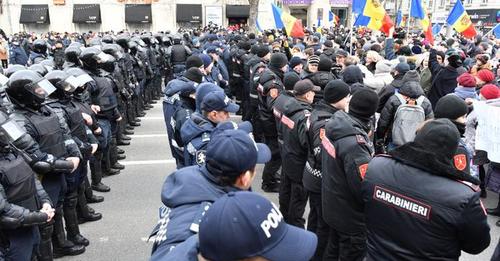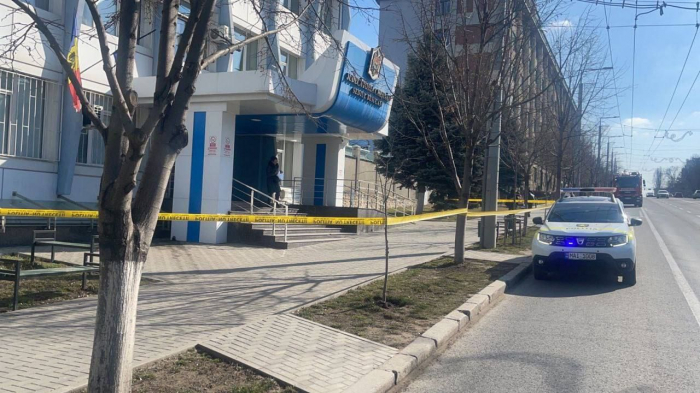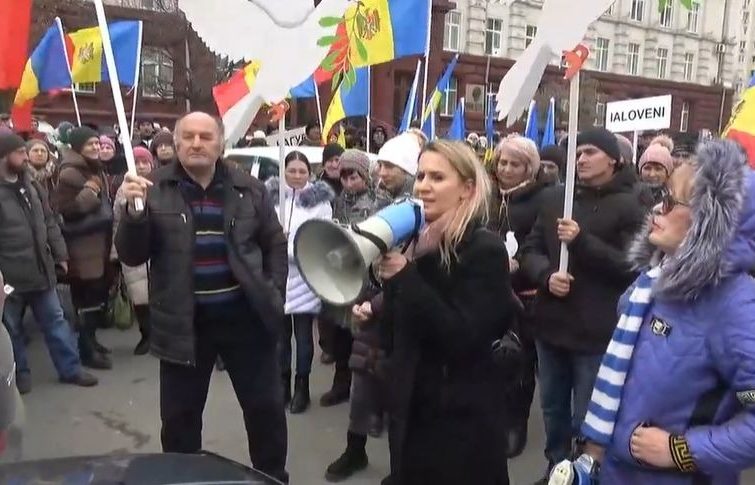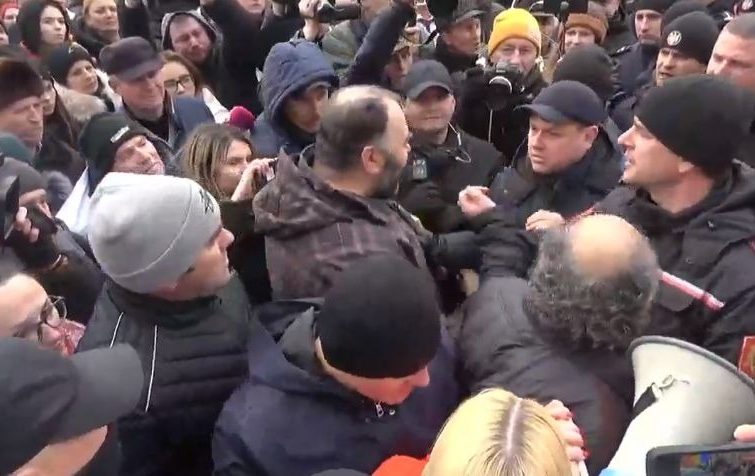
 On Wednesday morning, police officers patrolled streets, government and presidential buildings in Chişinau. So began the day in Moldova’s capital where thousands of people took to the streets yesterday demanding President Maia Sandu’s government resignation and snap parliamentary elections. “The police could be seen patrolling the streets of the city early this morning, in order to control and maintain public order, which is necessary to avoid escalation or potential cases of violence that would subsequently trigger harsh decisions, and plunge the country into an even more difficult situation,” we are told by Msgr. Cesare Lo Deserto, Vicar General of the diocese, speaking from Chisinau. Thousands of people blocked not only the downtown area of Chişinău, even attempting to storm government buildings, they also blocked the city’s main thoroughfares and entrances, causing distress and, above all, a very high state of alert. The protests are staged by Ilan Shor’s political party, a minority party in parliament, which has been pursuing a pro-Russian, anti-government policy for months. “It should be remembered – points out Lo Deserto – that the leader of this political party is a person with ties to Russia and with an international arrest warrant for the notorious billion-dollar thefts in Moldovan banks.”
On Wednesday morning, police officers patrolled streets, government and presidential buildings in Chişinau. So began the day in Moldova’s capital where thousands of people took to the streets yesterday demanding President Maia Sandu’s government resignation and snap parliamentary elections. “The police could be seen patrolling the streets of the city early this morning, in order to control and maintain public order, which is necessary to avoid escalation or potential cases of violence that would subsequently trigger harsh decisions, and plunge the country into an even more difficult situation,” we are told by Msgr. Cesare Lo Deserto, Vicar General of the diocese, speaking from Chisinau. Thousands of people blocked not only the downtown area of Chişinău, even attempting to storm government buildings, they also blocked the city’s main thoroughfares and entrances, causing distress and, above all, a very high state of alert. The protests are staged by Ilan Shor’s political party, a minority party in parliament, which has been pursuing a pro-Russian, anti-government policy for months. “It should be remembered – points out Lo Deserto – that the leader of this political party is a person with ties to Russia and with an international arrest warrant for the notorious billion-dollar thefts in Moldovan banks.”
 Protesters yesterday were calling for snap elections and for the government’s promise to settle gas and electricity bills that have soared repeatedly. “The protests are always linked to the crisis that is affecting the country – health crisis, energy crisis, economic crisis,” explained the Italian priest. These crises have caused widespread popular discontent involving the poorest segments of society, and the pro-Russians have been fanning the flames.” Equally worrying are the signs that airlines such as Air Moldova and WizzAir are sending out, having announced again yesterday that they were canceling some “flights due to operational difficulties.” “Clearly”, Lo Deserto remarked, “there is widespread concern and distancing. Wizzair is an important transport network connecting many cities in Europe. However, companies operating here are also worried and are seriously questioning the country’s overall stability. In short, the instability is not only about the protesters taking to the streets, it also involves all those who are questioning the safety of doing business in this country today.”
Protesters yesterday were calling for snap elections and for the government’s promise to settle gas and electricity bills that have soared repeatedly. “The protests are always linked to the crisis that is affecting the country – health crisis, energy crisis, economic crisis,” explained the Italian priest. These crises have caused widespread popular discontent involving the poorest segments of society, and the pro-Russians have been fanning the flames.” Equally worrying are the signs that airlines such as Air Moldova and WizzAir are sending out, having announced again yesterday that they were canceling some “flights due to operational difficulties.” “Clearly”, Lo Deserto remarked, “there is widespread concern and distancing. Wizzair is an important transport network connecting many cities in Europe. However, companies operating here are also worried and are seriously questioning the country’s overall stability. In short, the instability is not only about the protesters taking to the streets, it also involves all those who are questioning the safety of doing business in this country today.”
 “What will happen in the future is a daily concern – continues Lo Deserto – because we don’t know how far the protesters will go and whether they will adopt more aggressive positions. We also don’t know what could happen in Transnistria, which is another big question mark that must be monitored constantly because its involvement in the war would bring about very critical situations for the rest of Europe.” The situation in that strip of land on the Ukrainian-Moldovan border is critical. Yesterday, Russian-language radio stations in Transnistria issued a phony air raid alarm. Just the slightest “accident or even provocation” would be enough, however, to cause the situation to spiral out of control. That is why the Moldovan government intends to uphold a position of “neutrality and peace” with a constant dialogue with the authorities of Transnistria.
“What will happen in the future is a daily concern – continues Lo Deserto – because we don’t know how far the protesters will go and whether they will adopt more aggressive positions. We also don’t know what could happen in Transnistria, which is another big question mark that must be monitored constantly because its involvement in the war would bring about very critical situations for the rest of Europe.” The situation in that strip of land on the Ukrainian-Moldovan border is critical. Yesterday, Russian-language radio stations in Transnistria issued a phony air raid alarm. Just the slightest “accident or even provocation” would be enough, however, to cause the situation to spiral out of control. That is why the Moldovan government intends to uphold a position of “neutrality and peace” with a constant dialogue with the authorities of Transnistria.
“The Catholic Church is always in total agreement with Pope Francis’ position- reiterates the vicar general of Chisinau -. He invites us to be peacemakers in a context where only the desire for peace can result in an affirmation of the rule of law. It should be remembered that this is a country with two souls, and it has always been that way, in political, historical and cultural terms. Therefore, it is a country that allows for a certain amount of pro-Russian leanings because it forms part of its history, which must be embraced while always safeguarding peace.”









